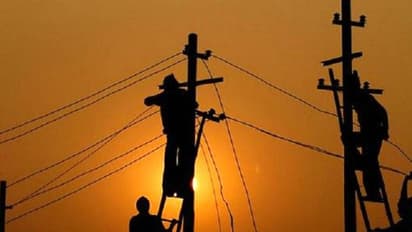G20 leaders agree to end public financing for coal-fired power generation abroad

Synopsis
The Group of 20 countries account for more than three-quarters of global greenhouse gas emissions. The summit host Italy searched for concrete objectives for reducing emissions while assisting developing countries in dealing with the effects of increasing temperatures.
Leaders of the world's largest economies agreed to a compromise goal to achieve carbon neutrality by or around mid-century as they concluded a two-day summit setting the basis for the United Nations climate conference in Glasgow, Scotland. According to the final communique, the Group of 20 leaders also agreed to end public financing for coal-fired power generation abroad but set no timetable for phasing out coal domestically, a clear nod to coal-dependent countries such as China and India, and a setback for Britain, which had hoped for more firm commitments ahead of the Glasgow meeting.
The Group of 20 countries account for more than three-quarters of global greenhouse gas emissions. The summit host Italy searched for concrete objectives for reducing emissions while assisting developing countries in dealing with the effects of increasing temperatures. Without them, momentum for the more considerable yearly discussions, which formally began Sunday in Glasgow and will include nations from all across the world, including the poorest, which are most vulnerable to rising seas, desertification, and other repercussions, might be lost.
Before the final working session on Sunday, Italian Prime Minister Mario Draghi warned the leaders that they needed to establish long-term goals while also making short-term measures to achieve them.
Also Read | Here's what G20 leaders final statement on climate stated; Details inside
He stated that we must speed up the phase-out of coal and invest more in renewable energy. He went on to say that we must also ensure that we use existing resources properly, which means we must adapt our technology and lives to this new environment.
According to the communiqué, the G-20 reiterated wealthy nations' previous promises to mobilise $100 billion yearly to assist poorer countries in dealing with climate change and promised to increase funding to assist them in adapting. The deadline to achieve carbon neutrality or net-zero emissions, which means a balance between greenhouse gases contributed to and eliminated from the environment, remained a sticking point.
Also Read | 'Last, best hope to keep 1.5C in reach,' says COP26 summit chief Alok Sharma
The G-20 leaders stated in the final communiqué that they would accelerate our mitigation, adaptation, and financing activities, recognising the critical need to reach global net-zero greenhouse gas emissions or carbon neutrality by or around mid-century.
"Some nations have selected 2050 as their target date for reaching net-zero emissions, whereas China, Russia, and Saudi Arabia have set 2060 as their target date," it stated. The future of coal, a significant source of greenhouse gas emissions, has been one of the most challenging issues for the G-20 to resolve. Leaders decided in Rome to stop providing foreign public money for new unabated coal power generating overseas by the end of 2021.
The inability of the G-20 to set a target for phasing out domestic coal consumption was a setback for the United Kingdom, which had hoped for progress on the subject at COP26. Max Blain, Prime Minister Boris Johnson's spokesperson, said the G-20 communiqué was never intended to be the critical lever in securing climate change pledges, which will be worked out at the Glasgow summit. Prince Charles of the United Kingdom addressed the G-20 on Sunday morning, urging leaders to listen to the young people who will inherit a warming Earth and warning that it is the last chance saloon.
Check the Breaking News Today and Latest News from across India and around the world. Stay updated with the latest World News and global developments from politics to economy and current affairs. Get in-depth coverage of China News, Europe News, Pakistan News, and South Asia News, along with top headlines from the UK and US. Follow expert analysis, international trends, and breaking updates from around the globe. Download the Asianet News Official App from the Android Play Store and iPhone App Store for accurate and timely news updates anytime, anywhere.